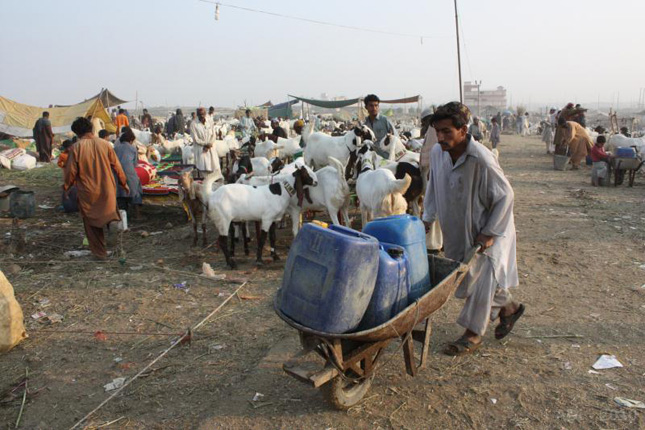-
The Next “Day Zero”: Water Scarcity and Political Instability Beyond Cape Town
March 22, 2018 By Nazia Hussain
Cape Town is running dry. But thanks to its sophisticated water management efforts, the city may ride out the crisis. However, other cities that lack these capacities are less likely to survive Day Zero. Especially in developing countries, where urban water services are often provided by informal or illegal actors, running out of water could have dangerous ripple effects for peace and security.
In developing countries around the world, the effects of climate change are increasing both water insecurity and political insecurity. Most water programs have focused on increasing access to water in rural areas, not cities. But by 2050, most people in Asia and Africa will live in cities, where water supplies sometimes depend on violent entrepreneurs, criminal groups, and other informal or illegal service providers.
Urban Water Services: Informal Providers Linked to Violence, Crime
Cities are not lawless frontiers of humanity; governments eventually call the shots. However, as their populations increase, the governments of some developing cities are falling behind, thus creating space for informal service providers, some of them armed, to fill. Violent entrepreneurs and criminal groups assume a governance role on the ground, provide essential services, and engage in local politics, creating a “new normal” that operates outside the regular bounds.
But this “new normal” is not sustainable, nor does it make living in these cities easier, especially for poor and marginalized populations. Take, for example, military operations in Rio de Janeiro, Brazil: Every few years, the state attempts to clean house and reduce the level of violence. The levels subside, only to rise again, while the political arrangements among players are continuously negotiated. Adding water scarcity to this volatile mix is likely to brew trouble.
Water is already a scarce commodity in Sao Paulo, Cairo, Mexico City, Nairobi, and Jakarta, just to name a few. Poor residents of Lagos, Nigeria, are wholly dependent on low-quality water provided by local criminal actors known as “area boys,” while privileged residents can access the municipal water system. Delhi’s “water mafia provides water to at least 20 percent of the city’s population.
Bribes and patronage by government officials sustain these rackets, which entangle state and non-state actors in a web of informal and formal relationships. Yet, as urban populations and water scarcity increases, these negotiated arrangements will be stressed to new heights.
Karachi: Criminal Groups and Political Factions Compete to Control Water
Water tankers in Karachi, Pakistan, are part of a booming private business worth at least half a billion USD. Bribes grease the wheels, accruing financial benefits for both government and non-state actors. Even the Taliban took a cut from the informal water business—which in some instances, led to infighting between factions over money.
Organized crime and political violence are the norm in Karachi, so seeing the political implications of water scarcity does not require a leap of imagination. Informal water delivery is not only an economic enterprise, it’s also political: Ensuring access to water in particular neighborhoods helps garner political support. Political players compete to secure territory, constituents, and bribes. Every few years, these competitions spill over into violence, which is tamped down by military operations, only to resurface.
Were a scenario like Day Zero to unfold in Karachi, it could potentially disrupt the city’s state-mediated equilibrium. Water is an existential necessity. If water is not delivered—or if people believe others are getting it and they are not—the lack of access could lead to popular unrest and sharpen ethnic, political, and social divides. Karachi’s panoply of armed actors—including Taliban factions, Al Qaeda, and subversive groups—would only add to the political instability and risk of violent conflict.
While the players may be different, Karachi’s patterns of urban insecurity are similar to many other cities. For cities like Karachi, preventing Day Zero from becoming Day One of a violent conflict will require not only engineering solutions, but also political ones.
Nazia Hussain is a JSPS-UNU Postdoctoral Fellow at Center for Policy Research, United Nations University, Tokyo.
Sources: Al Jazeera, BBC News, Brookings, Dawn, City Metric, Independent, New York Times, United Nations World Urbanization Prospect, Washington Post, Yale Environment 360
Photo Credit: A man transports water in Karachi, Pakistan, November 2010, courtesy of Flickr user Adeel Anwer.
 A Publication of the Stimson Center.
A Publication of the Stimson Center.



